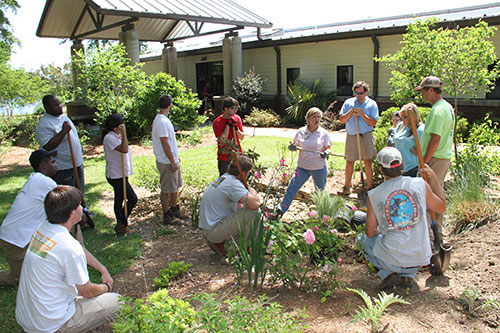
What do you want to be when you grow up? Do you enjoy hands-on learning, green thumbs, being outside and playing in the dirt?
Landscaping combines the joy of working outdoors with plants and the satisfaction of creating and maintaining attractive environments. Landscape managers take pleasure in the creative, artistic aspect of their work as they plan, design, and maintain the environments they care for. They must also understand business, marketing, management, sales, customer relations, quality control, labor issues, and computer applications. The Landscape Management Technology program at Hinds Community College offers comprehensive training which prepares you for a rewarding career. You will gain exposure to many aspects of the industry: landscape design, construction, installation, and maintenance.
Are The Jobs Out There?
Students may find employment with private landscape maintenance and construction firms, nursery and garden centers, interiorscaping firms, government agencies such as colleges and park systems, golf courses, and commercial or industrial complexes.
Overall employment in the landscape industry is projected to grow 13 percent through 2022. . Employment growth will vary by specialty. The largest specialty— grounds keeping and maintenance workers--- is projected to grow 12 percent through 2022. More workers will be needed to keep up with increasing demand for lawn care and landscaping services from large institutions, including universities and corporate campuses. Many aging or busy homeowners also will require lawn care services to help maintain their yards.
Employment of tree trimmers and pruners is projected to grow 18 percent, faster than the average for all occupations. Many municipalities are planting more trees in urban areas, likely increasing the demand for these workers.

Landscape Design: Use the environment as a canvas, beginning with a blank slate and ending with a functional and beautiful outdoor space for people to enjoy using plant materials and hardscape elements like stone, wood, and water features.
Landscape Installation: Implement the design plans created by landscape designers and landscape architects by installing plant and hardscape materials and using many types of equipment. Work might be done on residential, commercial, parks, shopping centers, college campuses.
Landscape Management: Work to preserve and enhance a client’s landscape investment with turf, shrub, and tree care as well as irrigation management and seasonal color installation and maintenance. Insect and disease monitoring and control is often part of the landscape manager’s duties.
Lawn Care: Turf management includes selection, installation, and maintenance of grass in residential and commercial applications. Monitoring irrigation, fertilization, insect and disease control are part of the duties of the lawn care service
Arborist: Prune, fertilize, and monitor trees for insects and diseases. Arborist must use ropes and harnesses to maintain trees.
Irrigation: Design, install, and maintain sprinklers for homes, businesses, golf courses, parks, and college campuses. Water conservation is important and offers many opportunities to assist customers with the best and most efficient watering methods.
Garden Center: Care for plants, give gardening advice, customer service, design merchandise displays, select items for the store to stock or sell, help customers design their gardens, develop advertising campaigns, write newsletters for customers.
Gardening Services: Prune, design, install, and maintain landscapes and gardens at homes, offices, parks, and malls.
This program is located on the Raymond campus of Hinds Community College. For more information, contact Martha Hill at MGHill@hindscc.edu and/or at 601.857.3290.
Check out this video on Career in Landscaping!
http://youtu.be/kshVUzStytE-













